Plus 2016
A Practical Handbook for Climate Change Adaption
Wed, 09/21/2016 - 12:18 — LangSeeds of resilients - A novel strategy to discover and use climate-adapted germplasm
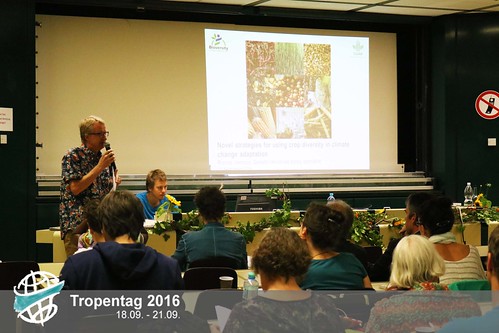
At the moment, there are 11 seed banks in developing countries, and they are coordinated by CGIAR centres around the world. Nevertheless, farmers are often still far away from breeding progresses and have no access to diverse, locally adapted seeds. Building up a community driven, decentralized seed banks should be a one of the main priority in future development work.
Bioversity International tries to use crop genetic diversity to face rural challenges and foster adaptation to climate change. This is why a handbook, a resource box for resilient seed systems was compiled in order to assist scientists, plant breeders, farmers and the practitioners in the field. About 150 different stakeholders coming either from the research field or from farms in several countries have worked on this handbook for 3 years..
The strategy presented in the handbook combines climate and crop modelling tools and participatory research methods, and it has 8 steps:
Sustainable development sounds great! On the diverging notions of the path leading to a sustainable, just future
Wed, 09/21/2016 - 10:54 — BergerDo you also get this uneasy feeling when participants from all institutions are always sharing one common opinion, one not really pronounced vision? It´s not that I would mind if we were all working together to achieve all sustainable development goals, a common vision. But this is obviously not the case!
There were some first signs of the diverging notions of sustainable development on Monday's keynote. Someone asked: „So why are there still poor people getting poorer?“ (See Elsby´s blog entry on it here: http://blog.tropentag.de/node/495). Sustainability is a very broad term, comprising also many contradictory opinions on how to reach the goal. Are primed seeds or rather commonly owned landraces the answer to food security? Is it really food security or rather food sovereignty that counts? What is our vision really about? Don’t we need to ask more fundamentally critical questions: which economic system will allow a world of equality, sustainability, and solidarity? And are systems going to be the solution anyway?
Tropentag Work Package 4 (WP4): Implementation
Wed, 09/21/2016 - 09:57 — BergerTropentag is a scientific conference - surely. Yet each serious research project has a work package dealing with implementation (because funders know it´s good for publicity) - so has Tropentag.
Solidarity in a competing world - a theme directly put into practice at the conference dinner on Tuesday night.
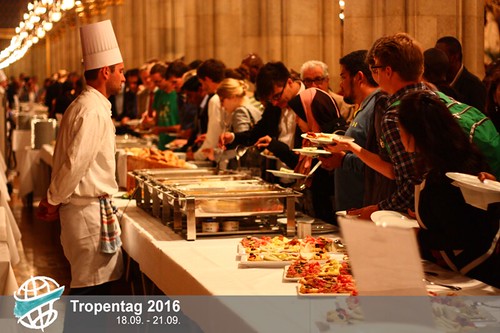
In a role game, participants could emotionally experience competition for limited resources. Solidarity developed - at least amongst the most marginalized at the very end of queues sharing the last bits of food. Meanwhile, waiters were emptying half empty plates into the darkness of Vienna´s sewage system.
But - let´s not forget: this conference is not only about solidarity. It´s also about fair use of resources. But what´s fair, anyway? Yet again: food proved to be the most hands-on- area of implementation. The following images of the Tropentag lunch will not need any further comment.
A Very Warm Welcome at the Conference Dinner
Wed, 09/21/2016 - 00:23 — Fadli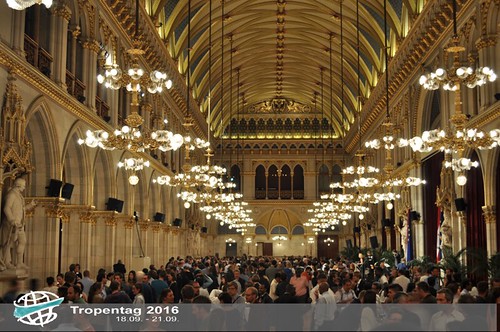
The second day of this year's conference just ended. It has been closed by the conference dinner at Vienna's historic City Hall: the perfect venue to feel the warm welcome from Tropentag. A traditional Viennese music ensemble, some delicious food, and an amazing location seem the be just a perfect combination to wrap up the intense day.

Indeed, I personally enjoyed when some participants took over the stage and performed their traditional dance. The others banqueters apparently had my same feeling as they clapped and joined the dance. Five people also got to receive the Ecoland Poster Award and a prize of 300 € each as the best Tropentag's posters. I hope you had a wonderful night too. But still, remember to spare some energy for the closing day tomorrow!
You can find more pictures of the dinner on our Flickr.Seeds of hope germinating: Rudolf Buehler presents the project that links farmers in Germany and Zanzibar
Tue, 09/20/2016 - 09:46 — BergerIt is late on Monday, or let´s say it feels late at least. Rudolf Bühler, Chairman of the Swabian Farmer´s Association and Marketing Organisation (BESH) in southern Germany, presented a short film introducing their collaboration with spice farmers in Kerala and Zanzibar.
BESH is well known in southern Germany as a showcase of farmers organising themselves to marketing the multiple values of their produce. BESH farmers have revived a local Swabian pig breed (Schwäbisch Hällisches Landschwein) and are successfully generating fair prices for their members.
The film “Seeds of Hope” shows how the BESH is trying to establish close links between all elements of the value chain - now also by including the direct exchange with spice producers in Kerala and Zanzibar. Rudolf Bühler started this cooperation in Kerala, India, where smallholder farmers produce local varieties of pepper, cardamom or cloves in a traditional multi-layered mixed cropping system, because he recognized how this growing system was already organic before being certified as such.
My personal highlight of Tropentag so far: Workshop 9 on Forest and Tropical Trees' Conservation
Mon, 09/19/2016 - 21:35 — PoscherBeside the great job of the presenters, two more reasons why it succeeded in my mind were:
1st. The discussions that critically analyzed the research finding and its (limited) impact on development 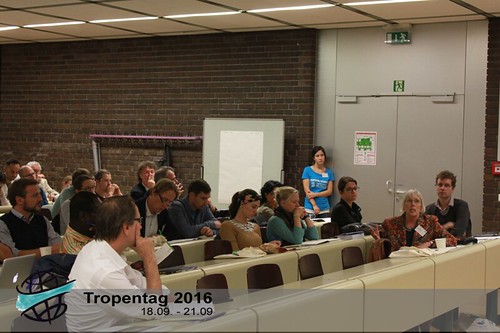
2nd. The closeness and approachability of the panel experts concearning ideas and knowledge exchange during the coffe break and afterwards.
YPARD workshop Mission 2026: Acting now to support youth in agriculture
Mon, 09/19/2016 - 16:43 — KootloleGrazing Game; Playful Way to Playing Climate Change
Mon, 09/19/2016 - 14:46 — FadliLearning of climate change now comes to a new method. Thanks to Grace Villamor and her team for Grazing Game. This game design as a tool to study the behavior of farmers is meant to respond to climate variability adaptation. Grazing Game comes in Board Game and Online Game. Villamor conducted trials in Benin and Ghana. “We do this also in order to avoid bias from farmers. Often, when we interview them, they tend to give exactly the answer we want to hear,” said the ZEF researcher. Participatory games like Grazing Game seem to be a solution against such bias.
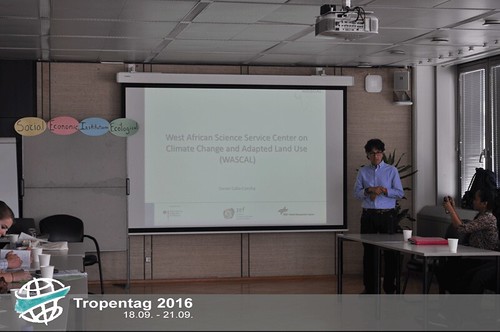
Ghana and Benin have been selected as trial countries because of their geographical location, at west Africa. And, as predicted, West Africa will have the most extreme climate change. Farmers, as actors, need to respond and take decisions on environmental conditions such us fluctuation of rainfall. Their response has reflected in the board game.
Men and Women Respond Differently




